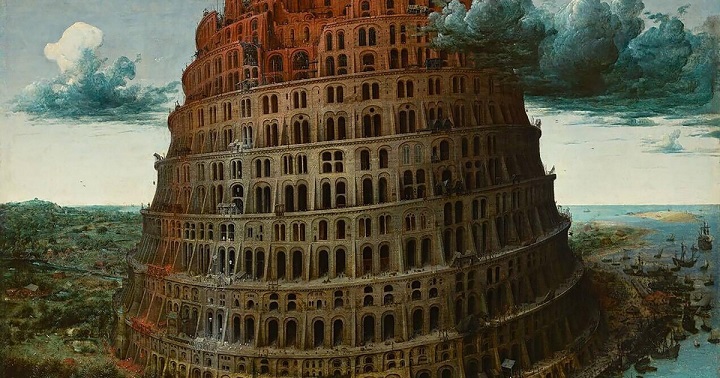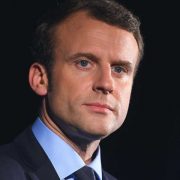
Genesis 11 recounts that in the city of Shinar a great tower was under construction symbolizing the achievements of the city. Work was going well thanks to the unity of the builders, who all spoke one language.
However as the tower reached farther and farther heavenward it invited divine displeasure. Seeing the project as an act of hubris, a challenge, the Hebrew divinity imposed on its builders a diversity of languages so that they could no longer understand each other. This disruption of communications prevented the completion of the edifice, which fell into ruins later known as the Tower of Babel. Reference to the city suggests the fratricide Cain, who, driven from Eden for his killing his pastoral brother, built the first city, Enoch.
In modern terms “language” includes ideologies, political systems, laws, customs, and so forth. After its victory in World War Two, Washington set out to rebuild the world in its own image, to bring all the nations into its sphere of values claimed to be universal. How has this towering project ended up?
World War One, for which no divinity has so far been held responsible, would be an earlier example of the breakdown of civilization that the Tower represents. As for the current NATO-Russia War more than one writer has likened it to World War One, due to the large scale of casualties and the small scale of territorial gains and losses, as well as the potential for the fighting to spark a far wider war.
It is worth recalling that the outcome of World War One remained uncertain until very late, the last half of 1918, unlike World War Two whose outcome became clear in the middle, in early 1943 for Europe. At the mid-point of World War One, but with no obvious winner, especially after the Brusilov offensive (June-August 1916) had exhausted the Tsar’s army, there was a chance for a peace settlement. The main Entente (Russia, France, Britain) rulers however wanted to fight on and so did their financial backers, the US banks.
Current US policy in Ukraine bears a strong resemblance to President Woodrow Wilson’s approach to World War One. In 1916 Wilson was elected by a thin majority, promising that no American soldiers would be sent to Europe’s war. Events in early 1917 enabled Wilson to change course. First of all Germany had launched submarine raids on shipping to England taking a toll of American ships. Secondly, Wilson had refused to join the war on the Entente side on the grounds that America could not ally with an autocratic Russia, only to have war declared in April 1917 after the Tsar abdicated to a democratic Kerensky. Washington (like Tokyo) joined the Entente side but not the Entente itself.
Wilson was adept at spinning noble rhetoric and exuding righteous enthusiasm but one can easily see through the spin to the strategic logic of lengthening the war by remaining neutral and then, once re-inaugurated, sending US troops to France as slowly as possible. Their arrival was completed a year later in spring 1918. Wilson was a Europhobe and thought it best for all the warring parties to be bled white so that they would accept American leadership and financial dominance. One of his goals was to weaken and thus penetrate the British empire.
For these reasons at a moment of stalemate and exhaustion of the warring parties, Wilson chose not to use American power and prestige to push for a settlement but rather encouraged continuation of the fighting with the declaration of war on Germany and more loans.
This brings us to the refusal of Washington to tolerate, even to mention, a negotiated end to the NATO-Russia war with explicit instructions to its man in Kiev to follow suit. This is in essence a reprise of Wilson’s decision to encourage continuation of the war.
For Washington in 2024 the Wilsonian logic of global dominance remains within a changing configuration of global power: Eurasia is the key, the world’s “heartland” in the Mackinder prescription. Europe had been getting along too well with Russia and China thus weakening Washington’s hold, making it necessary to yank Europe firmly back under NATO’s control and block the drift toward autonomy, above all Germany’s.
Moreover, blaming China for Russia’s successes provides the pretext for escalating economic war on China with new bans, sanctions, de-couplings, etc.. It’s almost as if the war was hardly about Ukraine at all, which explains the indifference of the NATO leadership to the toll on Ukraine’s people and society. For NATO’s drive to dominate the Eurasian continent the Ukrainians are as expendable as the Palestinians in the Middle East, even if President Zelensky had once argued that Ukraine would be America’s Israel in Europe.
Looking back to the days of Bismarck, who valued alliance with Russia, one can see that the very clockwork of Europe consisted in the ever-changing relations between Germany and Russia as they fluctuated between conflict and collaboration. In the third year of the Russia-NATO War Germany still clings to fragments of its lost relations with Russia.
The grand strategy for rescuing US global dominance is not succeeding as its global order breaks down. All players are speaking different languages. Popular nationalism and military conflicts are on the rise. Sanctions and warfare only increase global anger at Washington as revealed by the fiasco in Switzerland. Russia’s economy has strengthened not succumbed, confirming the adage: what doesn’t kill you will make you stronger. Even the dollar that unifies global trade seems at risk.
Moreover, Sino-Russian relations have strengthened, as NATO directly threatens jointly Russia and China, while NATO countries weary of the endless war and its escalating damage to their economies, which only serve American interests. But the price is heavy. The American position is increasingly isolated and untenable in Europe and globally with its role in the Israel-Palestinian War undermining its role in the NATO-Russia War, while domestically American politics degenerates into a modern iteration of the Tower of Babel – located in Washington, the Shinar of today.





